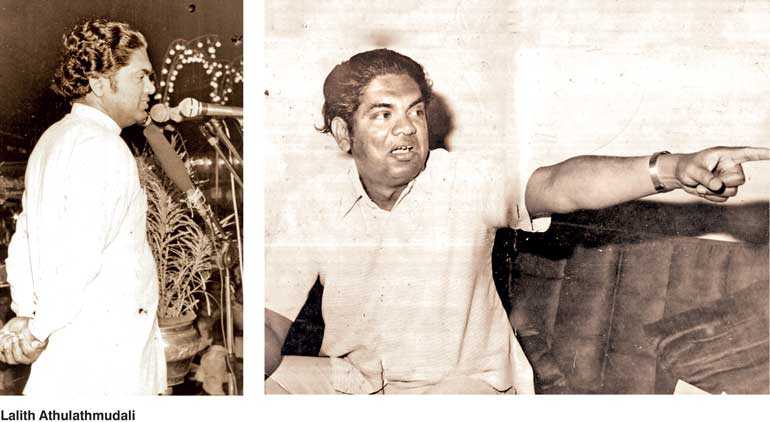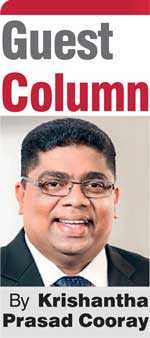Sunday Feb 15, 2026
Sunday Feb 15, 2026
Monday, 23 April 2018 00:00 - - {{hitsCtrl.values.hits}}

The twenty third day of April, 1993 is among a handful of blots in our national hall of shame. It was the day on which a lone gunman, perhaps with conspirators yet unknown, acted to neutralise a political threat by depriving all Sri Lankans of the intellectual gifts, charisma, service and dedication of one of our finest politicians, Lalith William Samarasekara Athulathmudali.

Much like Gamini Dissanayake, slain on October 24, 1994, and President Ranasinghe Premadasa, killed on May 1, 1993, Lalith was targeted and snuffed out because his vision, mission and political savvy made him so dangerous, that his opponents realised they could only ever prevail against him in the public arena by violently ending his life.
Twenty-five years later, the pattern could not be clearer. By killing Gamini Dissanayake, the LTTE spared themselves of a fierce opponent with unmatched local and international support to eradicate them. The LTTE, having killed President Premadasa, rid themselves of a leader who had even belatedly wised up to their treachery. Those who killed Lalith were spared of the relentless onslaught of a parliamentary dynamo who could rally politicians of any stripe to his causeat whim. This, he aptly demonstrated through his role in assembling the 1991 impeachment motion against President Premadasa, who himself was brought to a violent end on May Day in 1993, just days after Lalith was shot dead.
I was first introduced to Lalith Athulathmudali by my father. From that moment to this day, I still remain in absolute awe of the man. I remember that first day. I was nervous. I was hesitant. I was afraid I would say the wrong thing or ask the wrong question, and be quelled by his signature repartee. When Lalith spoke to me, his distinction as a man, a politician and an intellectual giant was apparent from his first words. His voice projected culture, clarity of mind and confidence. He articulated and enunciated every word he spoke, with a measure and delivery that seemed subconsciously tailored to his audience. It was no accident that people found it extremely easy to understand him.
While I remember Lalith as intellectually arrogant, he was open to new ideas. Like a judge in a courtroom of yore, he would listen carefully and patiently, ask probing questions, and at the end of a fruitful dialogue, he would adapt new ideas into his own worldview. In this way and others, he always projected himself as a leader. He was convinced that he was invincible. Those around him drew the same conclusion.
At first glance, he could appear aloof and unapproachable, but everyone who knew him well has their own story of how he warmed to them in his own unique way. Once you got to know him, he was always amiable. He always made time for you. It was easy to get close to him.
Even as a schoolboy, I vividly recall that one could call Lalith, leave a message and he would always call you back. Of that you could be certain. His interest in the children and youth of this country was altruistic. He believed in inculcating the next generation with the correct values, skills and drive to elevate Sri Lanka to be first among its peer nations.
Just talking to Lalith was an education in itself – no matter what the subject, just talking with him or even listening to him opened entirely new vistas, hitherto unexplored by the limitations of our own minds. A brilliant combination of Harvard and Oxford, he firmly believed that education was the only way to rid Sri Lanka – and for that matter, the world – of poverty, and he sought to further that belief through action every chance he got.
Lalith was already the stuff of legend by the time I first met him. My association with him only confirmed that the legend was true. He never let any setback, or any person get him down. He always rose above whatever hand fate dealt him. When he was “demoted” to Agriculture Minister, he bravely compared himself to four former Prime Ministers who had also been Agriculture Ministers during their tenures. He did the best he could in that position, got the best people possible, and fought all the way to make a difference and serve people in that portfolio.
I was once privileged to listen to, what I then thought, was the finest parliamentary speech ever given on the ‘no confidence’ motion against M.H. Mohamed. That brilliant oration went down in history, but sadly, it happened to be his last speech in the House. That was not just his last speech, but his last great parliamentary speech. A perusal of the Hansard in the 16 years he was in Parliament would show that he was among our best and certainly the finest intellectuals in Parliament in the post-1977 period. Those ‘from-the-heart-and-mind’ speeches of his would make most present day, self-proclaimed academics and intellectuals, in and out of Parliament, look small indeed.
Lalith had a tremendous capacity to identify talent, but he also made the mistake of trusting people too much, sometimes to his own detriment. This was a weakness to which, of course, he would never confess. He never admitted to being wrong about anything.
The implicit faith he placed in people was remarkable. During the politically tumultuous time of President Ranasinghe Premadasa’s impeachment, he would have confidential discussions with my father, despite the fact that my father’s brother was even then attached to the Presidential Secretariat. Yet, he confided in my father without the slightest doubt or suspicion that he would be quoted, or that someone would get the better of him because of those disclosures.
In the theoretically flawed lexicon of politics, Lalith would be classed right-wing, but he did more by way of redistribution of wealth than most avowed socialists did or envisioned.
Mahapola was his brainchild, and thousands upon thousands have benefited from this scholarship scheme. He was a senior minister in a Government that was dubbed ‘anti-nationalist’ but was staunchly patriotic in intent, conduct and in the results he delivered to his electorate and his nation.
He was more than just a statesman who towered above his colleagues in this country. He held his own anywhere in the world. He lectured in the Law Colleges of Singapore, Malaysia and even Israel, and delivered his first speech in the German language to a standing ovation when he was Trade Minister. Intellectually, Lalith was truly invincible. This country has not seen, and sadly may never see, the likes of him again.
Well, he’s gone. Today, our duty is to rise above the temptation to indulge in fruitless reminiscing, and indeed to ponder deeply on the paucity of such leaders in our country and remember that had Lalith lived, he would have taken this country to great heights. In him, this nation saw the intellectual capacity and the indomitable will-power to make Sri Lanka live up to her full potential.Now, two and a half decades after his murder, and the murder of nearly every other mind in his league of extraordinary leaders, and given a political landscape utterly barren of talent, competence, energy and vision, one is persuaded to think of the ‘what ifs.’
It is perhaps a tragedy that ours was not to be a world in which the likes of Lalith, Gamini Dissanayake and Ranasinghe Premadasa could combine their talents to take Sri Lanka forward. Sometimes political territories are too small for several giants to inhabit at the same time. Arrogance gets in the way. Egos get in the way. They were human, after all. Sadly.
The death of these three political heavyweights within a short space of time is a loss from which the United National Party has never properly recovered. Since their demise, the party has struggled to find politicians who could straddle the political stage with such prowess and oratorical brilliance; it has struggled to find leaders who can walk among the people, and feel their joys and their fears. And the country has suffered deeply as a result.
Perhaps the poverty of our circumstances makes him look larger in retrospect than he truly was, and persuades us to extrapolate further than we ought to. But whichever way one looks at it, he was exceptional.
Where today could Sri Lanka point to a political leader who is punctual to a fault, brings intellectual horsepower, creativity and political savvy together to a policy decision-making process, and who would support their ‘troops’ with gratitude when they succeed together, and with fierce loyalty when things go wrong? Lalith never left his people hanging out to dry.
Lalith, when the long history of our post-Independence era is written, will receive the plaudits of even the most acerbic of his critics. As we commemorate the 25th anniversary of this great man’s supreme sacrifice today, we are saddened and reminded of everything Sri Lanka could have been under his direction and leadership.
In his death, 25 years ago, Lalith Athulathmudali rendered us a poorer nation indeed.